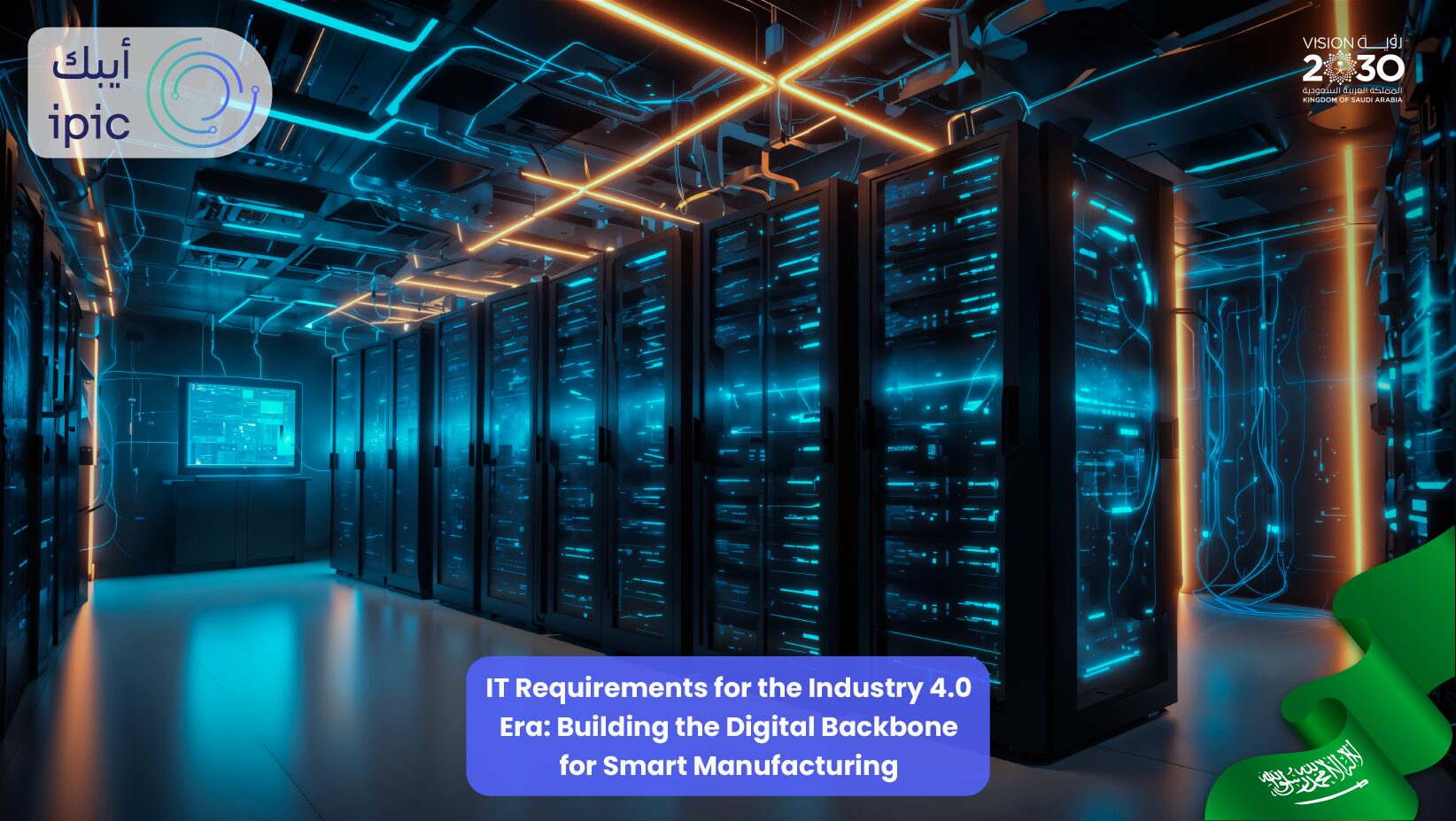IT Requirements for the Industry 4.0 Era: Building the Digital Backbone for Smart Manufacturing
Introduction
Industry 4.0 is transforming manufacturing by integrating cyber-physical systems, AI, IoT, and cloud computing. But behind every smart factory, there’s a powerful IT infrastructure enabling the shift.
To successfully transition into the Industry 4.0 era, manufacturers must ensure their digital infrastructure and technology systems are future-ready. In this article, we’ll break down the essential IT requirements manufacturers need to succeed in the digital age — and explore how companies like IPIC play a vital role in driving this transformation.
1. Robust Network Infrastructure
Why It Matters: Industry 4.0 relies on real-time communication between machines, sensors, cloud systems, and people.
- Industrial-grade LAN/WAN networks
- Wireless connectivity (Wi-Fi 6, 5G)
- Edge computing capabilities
- Time-sensitive networking (TSN)
✅ Goal: Ensure fast, low-latency, and reliable machine-to-machine (M2M) communication.
💡 IPIC Insight: Helps factories evaluate and upgrade their industrial networks to enable seamless connectivity.
2. Cybersecurity Framework
Why It Matters: More connectivity means greater risks of cyberattacks targeting IT and OT systems.
- Zero Trust architecture
- IT/OT network segmentation
- Multi-factor authentication (MFA)
- Firewalls, intrusion detection, endpoint protection
- Regular vulnerability assessments
✅ Goal: Protect digital assets, production data, and intellectual property.
💡 IPIC Insight: Provides specialized cybersecurity consulting for industrial environments.
3. Scalable Cloud and Edge Computing
Why It Matters: Industry 4.0 generates massive data that needs to be stored, processed, and analyzed effectively.
- Hybrid cloud platforms (AWS, Azure, GCP, or private cloud)
- On-site edge devices for local processing
- Secure cloud gateways and APIs
- Real-time data sync with MES/ERP
✅ Goal: Enable flexible and fast access to production intelligence.
💡 IPIC Insight: Deploys suitable cloud and edge solutions for operational performance.
4. Unified Data Architecture and System Integration
Why It Matters: With data from many sources (machines, ERP, MES, CRM), it must be centralized, cleaned, and unified.
- Data lakes or warehouses
- Unified formats (OPC UA, MQTT, JSON)
- ETL pipelines (Extract, Transform, Load)
- Integration middleware and APIs
✅ Goal: Create a single source of truth across the organization.
💡 IPIC Insight: Designs unified data architectures and integrates manufacturing/business systems.
5. AI and Advanced Analytics Capabilities
Why It Matters: AI turns raw data into actionable insights to predict failures, improve quality, and boost efficiency.
- Machine learning platforms and analytics tools
- Real-time dashboards
- Predictive models in MES/ERP
- Data governance policies
✅ Goal: Enable smart and autonomous factory operations.
💡 IPIC Insight: Enables manufacturers to adopt AI and advanced analytics.
6. Integration with Industrial Control Systems (SCADA, PLC, DCS)
Why It Matters: True Industry 4.0 success requires seamless IT/OT convergence.
- Secure OT gateways
- Support for industrial protocols (Modbus, OPC UA, PROFINET)
- Integration between ERP/MES and plant systems
- Unified dashboards for engineers
✅ Goal: Achieve transparency and full control across production environments.
💡 IPIC Insight: Bridges operational and administrative systems for efficiency.
7. Smart Asset and Device Management
Why It Matters: Industry 4.0 depends on thousands of smart connected devices that need constant monitoring and maintenance.
- Centralized device management platforms
- Asset tracking systems (RFID, GPS, QR)
- Over-the-air (OTA) updates
- Remote diagnostics tools
✅ Goal: Ensure operational continuity and efficient IoT device management.
💡 IPIC Insight: Implements smart monitoring and lifecycle optimization systems.
8. Digital Collaboration Tools for the Workforce
Why It Matters: Digital transformation is not just about machines — it’s also about people.
- Cloud-based communication platforms (Teams, Slack, Zoom)
- Integrated project management systems
- Mobile-compatible factory apps
- AR/VR support for training and remote assistance
✅ Goal: Empower a digital-ready, agile workforce.
💡 IPIC Insight: Provides tools to enable collaboration and training in smart factories.
9. Compliance and Data Privacy Management
Why It Matters: With increased data collection comes responsibility for privacy and legal compliance.
- Compliance with GDPR, ISO/IEC 27001
- Data retention and anonymization policies
- Role-based access control
- Reporting and auditing systems
✅ Goal: Build customer trust and meet regulatory obligations.
💡 IPIC Insight: Helps factories with compliance and international standards adherence.
Conclusion
Industry 4.0 is driven by data, connectivity, and intelligence — but all of it depends on a strong digital infrastructure.
For manufacturers to thrive in this new industrial era, they must invest in secure, scalable, and integrated IT systems.
🚀 IT is no longer just a support function — it’s the digital backbone of smart manufacturing.
And IPIC is leading the way in supporting Arab manufacturers on their journey toward a smart, connected, and future-ready industrial ecosystem.



